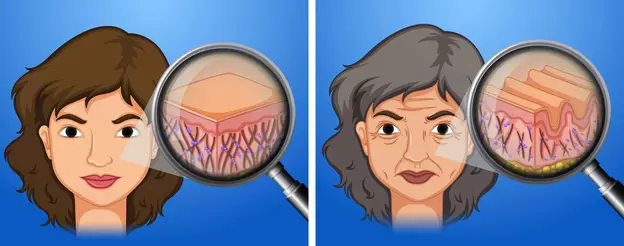10 Signs & Symptoms Of Collagen Deficiency

10 Signs & Symptoms Of Collagen Deficiency
Posted on 24th Apr, 2023
Collagen is a crucial protein present in our bodies that plays a significant role in maintaining skin, hair, bones, and joint health. It acts as a building block for various tissues, including tendons, ligaments, and cartilage, and is responsible for maintaining skin elasticity, firmness, and hydration.
However, with aging, collagen production starts declining, leading to several health issues. In this article, we will discuss the signs and symptoms of collagen deficiency and ways to increase collagen production.
What is collagen deficiency?
Collagen deficiency refers to the reduced production of collagen in the body. This may occur due to aging, a poor diet, certain medical conditions, or environmental factors such as pollution and UV radiation. Collagen deficiency can lead to various health problems such as wrinkles, joint pain, osteoporosis, and gut issues.
How to know if you have collagen deficiency?
If you experience any of the following signs and symptoms, it may indicate collagen deficiency:
Wrinkles & other aging effects:
Collagen is the connective tissue component present in our skins in abundant. It is responsible for maintaining skin elasticity, firmness, skin thickness, and hydration. It also maintains a fiber network through which it holds the muscles, organs, and other structures at a place in our body.
However, as we start aging these fiber networks and connective tissue in form of collagen start reducing, leading to wrinkles and sagging skin.
Slow muscle recovery or muscle pain:
As a connective tissue, collagen is present in tendons as well as ligaments connecting muscles to muscles and muscles to bones. As collagen level starts decreasing it can cause shrinkage in muscles and tendons, leading to additional friction and muscle pain.
Similarly, when you do not have enough collagen in your body, it becomes difficult to repair the injured muscle of the body.
Gastrointestinal problems:
Amongst other gastrointestinal problems, the “Gut Leaking” problem is more severely related to collagen deficiency. It is a condition where the gaps in the intestine start allowing toxins and bacteria to enter the bloodstream.
In Leaky gut syndrome, the larger particle may slip out, cousing inflammation and infection. Now this condition of the Leaky Gut arises only when the collagen level is insufficient to repair the intestine.
Joint pain or osteoporosis:
As we start aging, one common problem is joint pain, which is often due to insufficient collagen. Collagen is present in cartilage that cushions our joints. Collagen deficiency can lead to the loss of elasticity and supporting nature of tendons, ligaments, cartilage, and bone structures, causing joint pain and inflammation.
Slow injury recovery:
A deficiency in collagen can lead to slower injury recovery due to the body's reduced ability to repair damaged tissues.
As we age, our collagen production slows down, making it more challenging for the body to repair injured tissues. When there is a collagen deficiency in the body, the recovery process slows down, and it takes longer for the body to heal from injuries.
Cellulite:
Cellulite is the result of fat cells pushing against weakened connective tissue, causing the skin to look lumpy and dimpled.
The main cause of cellulite is the breakdown of collagen fibers beneath the skin's surface. When the collagen fibers weaken, the skin's elasticity decreases, and fat cells can bulge through the weakened fibers, resulting in the appearance of cellulite.
Hallowed cheeks & eyes:
Collagen plays a critical role in maintaining facial volume and structure. A lack of collagen can lead to a decrease in skin’s elasticity causing the cheeks and eyes to appear hallowed. This can result in a sunken, aged look, making one appear older than they are.
Blood pressure and circulatory problems:
Collagen is essential in maintaining the strength and elasticity of blood vessels. A collagen deficiency can cause blood vessels to weaken, leading to high blood pressure and circulatory problems.
Collagen is involved in maintaining the structure of blood vessels. Collagen deficiency can lead to weakened blood vessels, resulting in high blood pressure and circulatory problems.
Brittle hair and nails:
Collagen is also present in our hair and nails, and its deficiency can lead to brittle, thinning hair and nails.
Organ Prolapse:
Organ prolapse is a condition where one or more organs, such as the bladder or uterus, drop from their normal position and protrude into the vaginal canal.
Organ prolapse is more common in women than in men. A collagen deficiency may also contribute to the development of organ prolapse, so it is essential to ensure adequate collagen intake to maintain the structural integrity of our organs.
Ways to increase collagen production
If you suspect you have a collagen deficiency, there are ways to increase your collagen production:
Include collagen-rich food
To increase collagen production in your body, you can include collagen-rich foods such as bone broth, chicken, fish, egg whites, and leafy greens in your diet. Consuming these foods can help increase collagen production in the body.
Include collagen-rich supplements
The best way to compensate for collagen deficiency is to include collagen supplements. As these are super versatile and can be taken in many different ways such as collagen peptides, collagen powder, and collagen capsules.
These supplements are easy to consume and can help boost collagen production in the body.
Conclusion
Collagen deficiency can lead to several health problems, and it's crucial to identify the signs and symptoms to prevent further complications. Incorporating collagen-rich foods and supplements can help boost collagen production and maintain healthy skin, hair, bones, and joints. However, before starting any supplements, it is advisable to consult a healthcare professional.

Health articles from our experts

List of Top Whey Proteins for Muscle Gain

Benefits of Protein Powder on Men's and Women's Health

A complete guide on sexual wellness supplements for couples

List of Top 10 Ayurvedic Medicine for Constipation

What Is The Right Dosage for Omega-3 Supplements?

Top 10 Sexual Wellness Supplements Brands in India

The Power of Probiotics: Nurturing Gut Health for Overall Wellbeing

Boosting Libido Naturally: A Guide to Effective Sexual Wellness Supplements

Multivitamins for Hair, Skin, and Nail Health: Enhancing Your Natural Beauty



